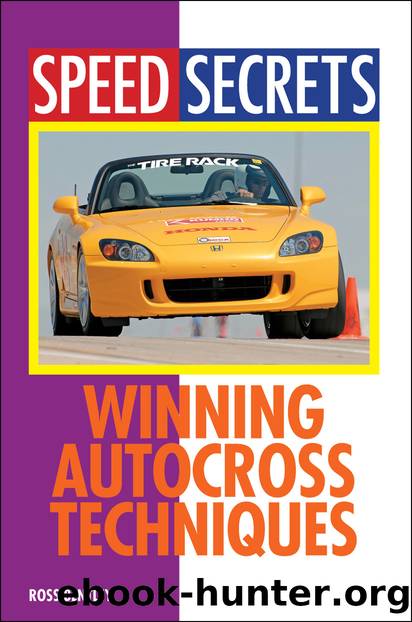Winning Autocross Techniques by Ross Bentley

Author:Ross Bentley
Language: eng
Format: epub
Publisher: Motorbooks
Published: 2010-03-15T00:00:00+00:00
Improving Sensory Input
As I said, the better the quality, and the more quantity of sensory input, the better the job your brain can do to tell your body what to do. So how do you improve your sensory input? Through practice; focused practice.
Just like a person who has just become blind does not have the sensitivity to read Braille but develops it with focused practice, you can improve your visual, kinesthetic, and auditory sensitivity through practice.
One way to improve your ability to soak up quality sensory input is to do what I call Sensory Input Sessions:
⢠While driving, whether during a run or just driving on the street, focus on hearing the car and course or road surface. Make note of every sound: the exhaust note, engine mechanical noises, tires gripping the road surface, wind passing the car, and so on.
⢠Then, for a while, make note of the g-forces against your body, the amount of body roll and pitch the car experiences, the tires as they grip the course and then begin to slide, the amount of flex in the tire sidewalls, how harsh or soft the car feels going over bumps, how quick the steering response is, the vibrations and feedback through the steering wheel, the vibrations in the brake pedal, and so on.
⢠Finally, spend time focusing on what you can see, such as every little crack and undulation in the course surface, the direction your visual point of view changes as the car rotates and slides, the speed at which things in your peripheral vision are passing by, and so on.
Doing these exercises will make you much more sensitive to what the car is doing and will improve the quality of input to your brain. Again, the better the quality of input, the better your output (skills) will be; not to mention becoming better at sensing what your car needs to handle better.
I know what youâre thinking: âI only get a few runs in a day. I donât have time to waste doing this exercise.â Donât you? You mean to tell me you donât have time to give your brain quality information to work with? If thatâs the case, then I guess you donât have time to win! Great drivers were not born with a natural ability to sense what the car is doing better than anyone else. No, they just practiced being more sensitive to what the car is telling them. They may not even be aware that is what theyâve done, but itâs as simple as that. They may not have consciously set out to do Sensory Input Sessions, but essentially through practice that is what theyâve done.
No matter what level your driving is at now, you have a choice to make: You can just get more seat time, and in doing so you will develop your sensitivity to the car; or you can purposely set out to develop this skill more quickly by using a strategy called Sensory Input Sessions.
By the way, about
Download
This site does not store any files on its server. We only index and link to content provided by other sites. Please contact the content providers to delete copyright contents if any and email us, we'll remove relevant links or contents immediately.
The Inner Game of Tennis by W. Timothy Gallwey(3687)
Unstoppable by Maria Sharapova(3524)
Crazy Is My Superpower by A.J. Mendez Brooks(3400)
Urban Outlaw by Magnus Walker(3395)
Mind Fuck by Manna Francis(3193)
The Social Psychology of Inequality by Unknown(3029)
The Fight by Norman Mailer(2940)
Unstoppable: My Life So Far by Maria Sharapova(2502)
Accepted by Pat Patterson(2368)
Going Long by Editors of Runner's World(2362)
Futebol by Alex Bellos(2359)
Backpacker the Complete Guide to Backpacking by Backpacker Magazine(2245)
Sea Survival Handbook by Keith Colwell(2242)
Motorcycle Man by Kristen Ashley(2238)
The Happy Runner by David Roche(2237)
The Sports Gene: Inside the Science of Extraordinary Athletic Performance by David Epstein(2176)
Peak: Secrets from the New Science of Expertise by Anders Ericsson & Robert Pool(2033)
Endure by Alex Hutchinson(2026)
The Call of Everest by Conrad Anker(1909)
